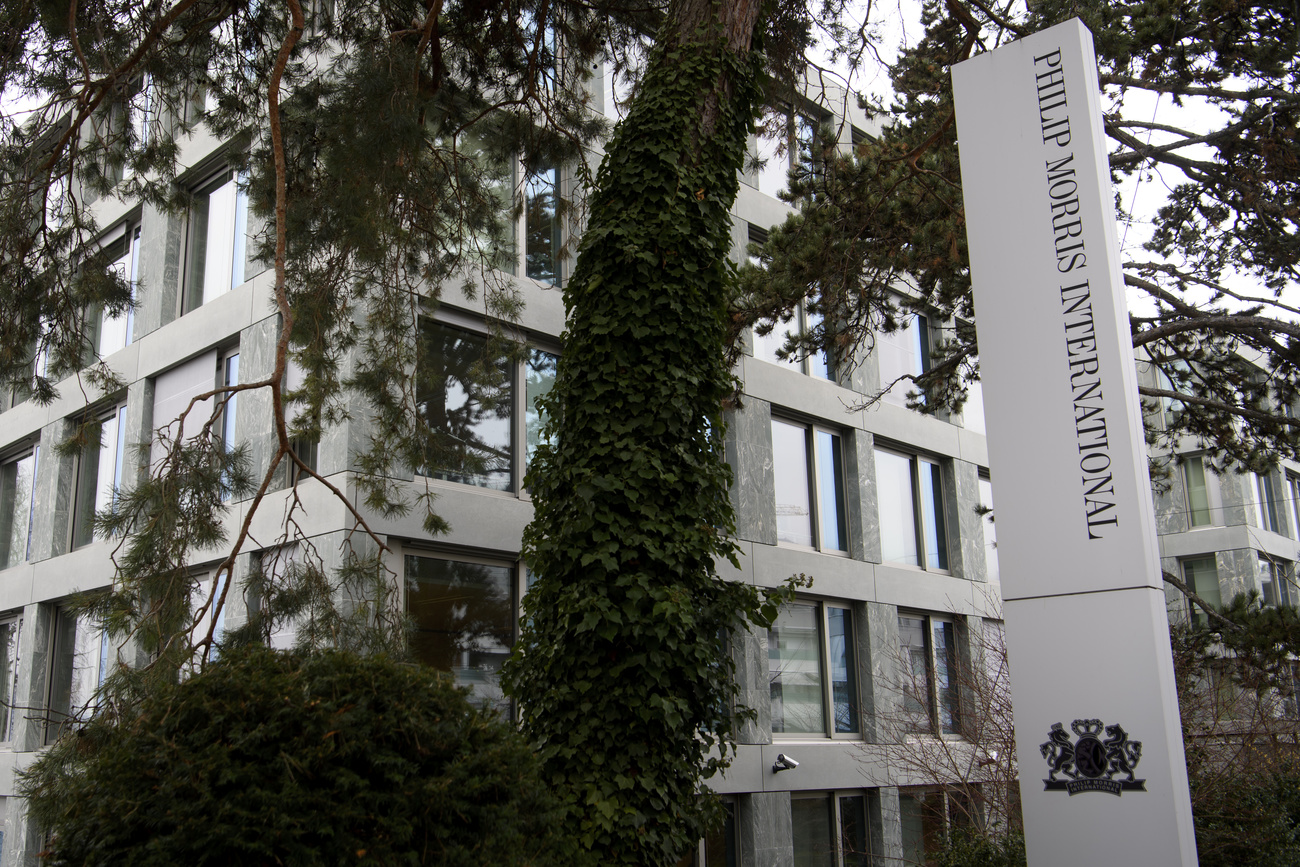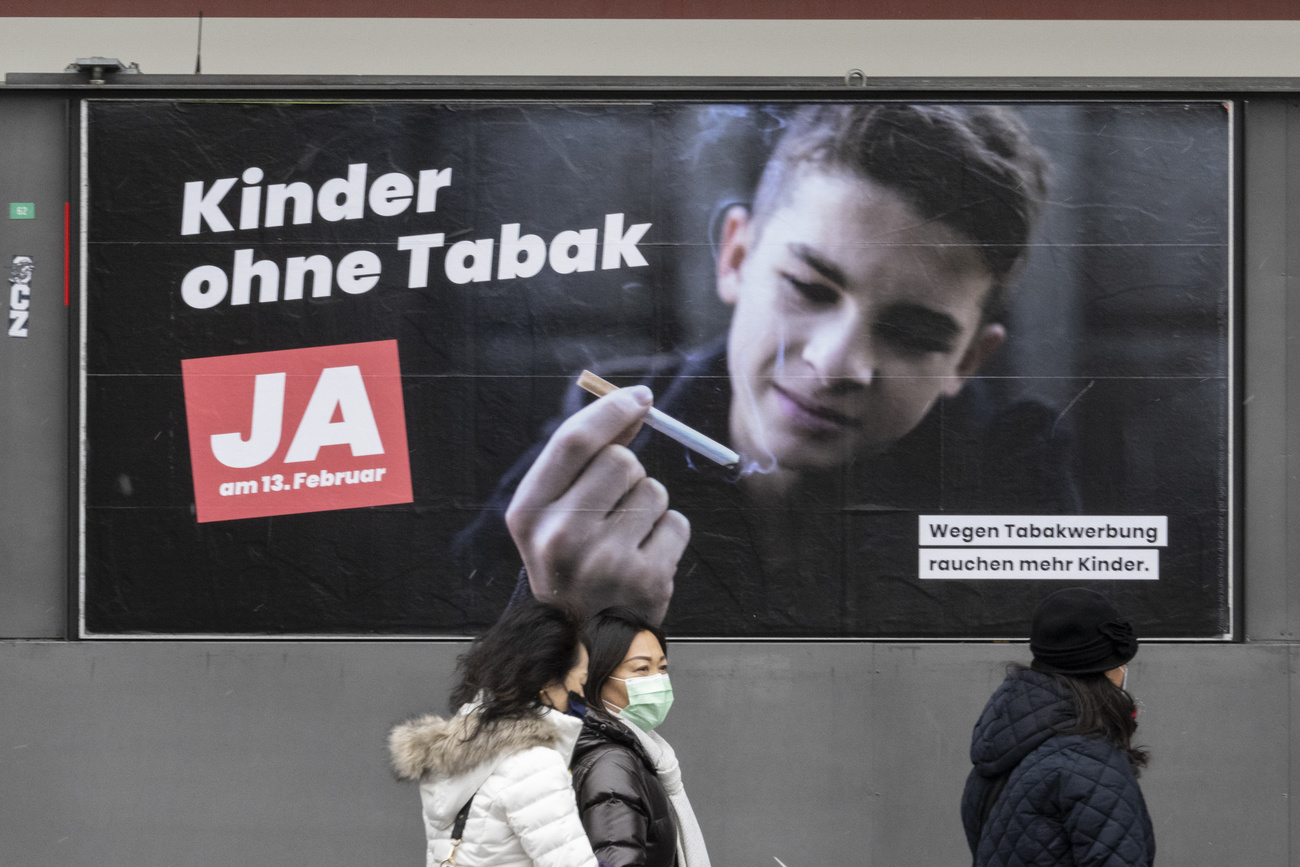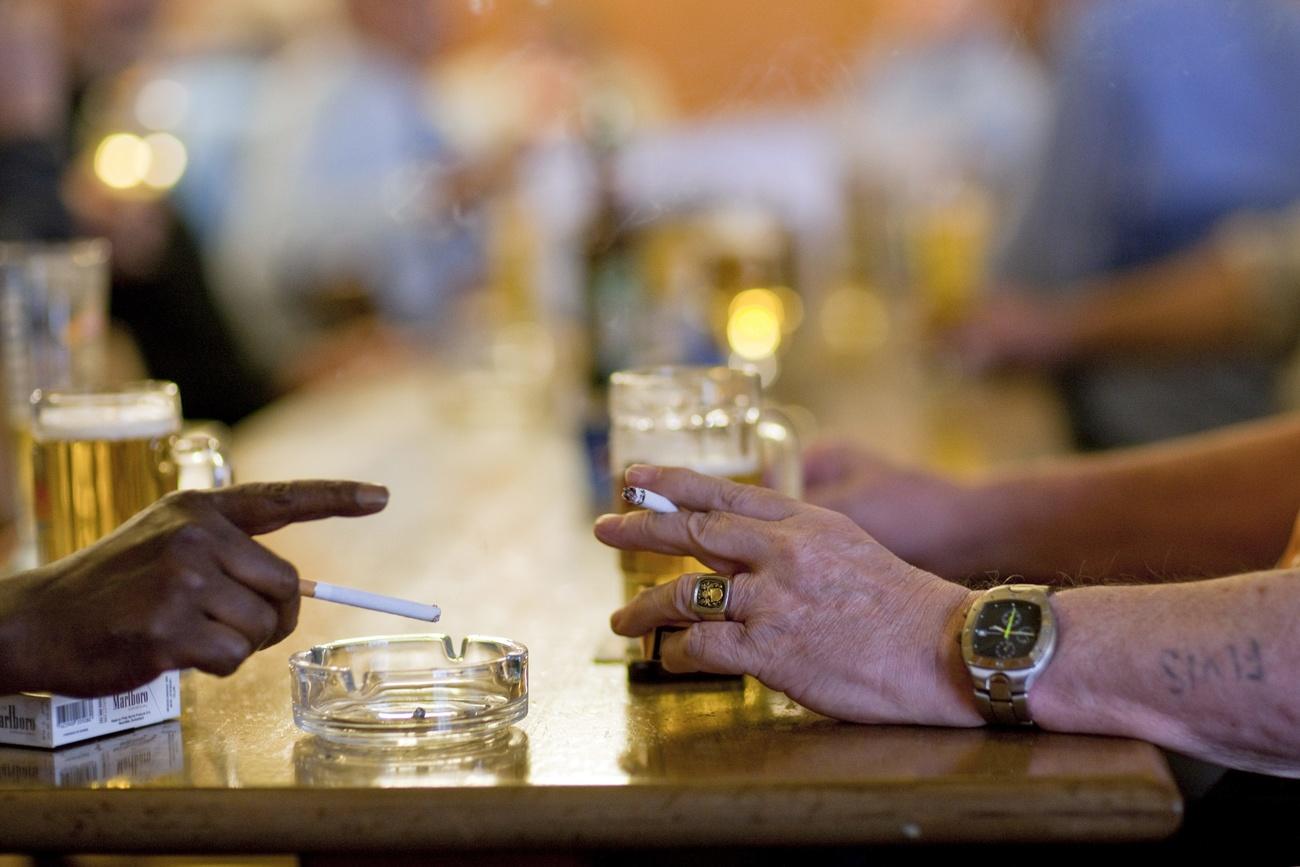Why Switzerland has one of the world’s strongest tobacco lobbies

With Sunday’s vote in favour of a ban on tobacco advertising targeting youth, Switzerland is bringing its tobacco control regime in line with Europe. Why did it take so long?
“The people have understood that health is more important than economic interests,” Stefanie de Borba of the League against Cancer told the AFP news agency after Sunday’s vote.

More
Results of the vote of February 13, 2022
In that vote, just over 56% of voters and a majority of cantons supported the people’s initiative for “the protection of children against tobacco advertising”. Health and youth organisations behind the initiative had called for Swiss law to come into line with what’s being done elsewhere in Europe to combat smoking.
Changing laws has been an uphill battle due to the strong industry lobby in the country and its influence in political circles. Switzerland is home to the world’s largest cigarette companies, including Philip Morris International and British American Tobacco. There is also a notorious permeability between private interests and politicians in the country.

More
Swiss back further restrictions on tobacco advertising
Slow-motion change
Switzerland has had the weakest tobacco control regime in all of Europe. In the latest Tobacco Control Scale study (published in 2019), which monitors the implementation of tobacco control policies in countries across Europe, only Germany ranked lower. Since then, however, as the website watson.ch has pointed outExternal link, the German government has introduced a general ban on tobacco advertising.
In Switzerland, meanwhile, nothing has changed for years. The people’s initiative was a direct reaction to the parliament’s rejection of a previous tobacco bill in 2015External link. It was not until the initiative was launched that parliament, under pressure, passed a new tobacco law in October 2021. This legislation, however, still did not meet the requirements of the World Health Organization (WHO) Framework Convention on Tobacco Control.
Parliament’s continued foot-dragging on this issue is preventing Switzerland from complying with the provisions of this treaty, which it signed in 2004 but has never ratified.
An industry close to politics
If attempts to strengthen anti-smoking measures have failed so far, it is because a significant number of key politicians are sympathetic to the cause of the tobacco industry.
In Switzerland, tobacco companies have almost free rein to advance their interests through elected officials. According to the Global Tobacco IndexExternal link, drawn up by health circles, Switzerland ranks as one of the countries where the tobacco industry has the strongest hold on politics (it comes in 79th place, out of 80 countries examined; only the Dominican Republic fares worse).
The Global Tobacco Industry Interference Index is produced by the Global Centre for Good Governance in Tobacco Control (GGTC), a partner in the WHO Framework Convention on Tobacco Control.
The index is based on 20 indicators established in line with the guidelines of the framework convention. It measures efforts by governments to address tobacco industry interference.
A points system is used for the rating. The higher the score, the lower the country ranks and the greater the industry’s influence. The latest report was published in November 2021.
Switzerland rates particularly poorly because of its high vulnerability to conflicts of interest. There is nothing to stop the tobacco industry from participating in policy-making or from financing candidates or parties; partnerships between public officials and tobacco companies are legal, with no requirement of transparency. In 2019, for example, a scandal broke after Philip Morris announced its sponsorshipExternal link of the Swiss pavilion at Expo 2020 in Dubai.
Above all, under the Swiss system, which allows politicians to have vested interests, parliamentarians may be remunerated by different groups and organisations in parallel to their elected functions.
“This creates a very strong permeability between elected officials and private interests,” explains André MachExternal link, author of the book Groupes d’intérêt et pouvoir politique (Interest Groups and Political Power).
Switzerland’s poor international ranking comes as no surprise to Mach, an associate professor at the University of Lausanne’s Institute of Political Studies. “We have known for a long time that lobbies, in particular the tobacco industry, are particularly present in Swiss political life,” he tells SWI swissinfo.ch.
Vested interests arise when Swiss parliamentarians hold other positions in parallel with their political mandate, whether with private companies, economic groups, non-governmental organisations, trade unions or public bodies.
Such mandates, be they voluntary or paid, are not necessarily related to their main professional activity. They can include chairing the board of directors of a large company or volunteering with a local association.
Vested interests are legal, and are often presented as part of the unique Swiss militia system. In Switzerland, unlike in other countries, members of parliament are not professional politicians, but are expected to maintain a gainful occupation.
Elected representatives must declare any mandates when they take office and at the beginning of each year.
Discreet but powerful lobby
Although it is perfectly legal to be funded by a tobacco multinational while serving in the Swiss parliament, the industry exerts its influence in Bern rather discreetly. According to the association LobbywatchExternal link, which monitors the different lobbies in parliament, only one elected representative has a direct and explicit link with the tobacco industry – the right-wing Swiss People’s Party politician Gregor RutzExternal link, who chairs Swiss TobaccoExternal link, the umbrella association of Swiss tobacco companies, and who is fiercely opposed to any new restrictions on advertising.
Another way of exerting influence is through accredited persons. All parliamentarians have the right to grant two people of their choice unlimited access to parliament. These VIPs include some professional lobbyists who have tobacco companies among their clients, as well as active members of organisations promoting the interests of the tobacco industry. This is the case, for instance, of the general secretaries of Swiss TabacExternal link and Swiss CigaretteExternal link, who are accredited by two MPs from the centre-right Radical Liberal party. The association Swiss Cigarette was set up by the three tobacco giants based in Switzerland: Japan Tobacco International (JTI), British American Tobacco (BAT) and Philip Morris (PMI).
The tobacco industry can also rely on the support of highly influential “generalist” organisations that defend the interests of the business community, such as the Swiss business federation economiesuisse and the Swiss Union of Small and Medium-Sized Enterprises (USAM), both of which were against the proposed reform.
Mach also highlights the central role of the Alliance of Businesses for a Moderate Prevention Policy (AEPMExternal link), an offshoot of USAM that brings together some 20 sectors of the economy – not just the tobacco industry, but also other branches (e.g., catering, events, alcohol) that would be indirectly hit by tougher anti-tobacco measures.
According to our calculations, economiesuisse, USAM and the member organizations of the AEPM have a total of around 40 ties with parliament.
A heavyweight in the Swiss economy
In addition to being well-connected, the tobacco industry derives political influence from its economic weight. The three behemoths in the sector, Japan Tobacco International, BAT and Philip Morris, have been present on Swiss soil for many years with research centres and production plants.
A studyExternal link carried out by consultancy firm KPMG (on behalf of Philip Morris) in 2017 found that the tobacco sector accounted for more than 6,000 direct jobs and generated over CHF6 billion ($6.5 billion) per year (around 1% of Swiss GDP) to the economy. “This situation certainly affects the position of some elected officials and makes it more difficult to impose further constraints on the sector,” says Mach.
Adapted from French by Julia Bassam.

In compliance with the JTI standards
More: SWI swissinfo.ch certified by the Journalism Trust Initiative










You can find an overview of ongoing debates with our journalists here . Please join us!
If you want to start a conversation about a topic raised in this article or want to report factual errors, email us at english@swissinfo.ch.